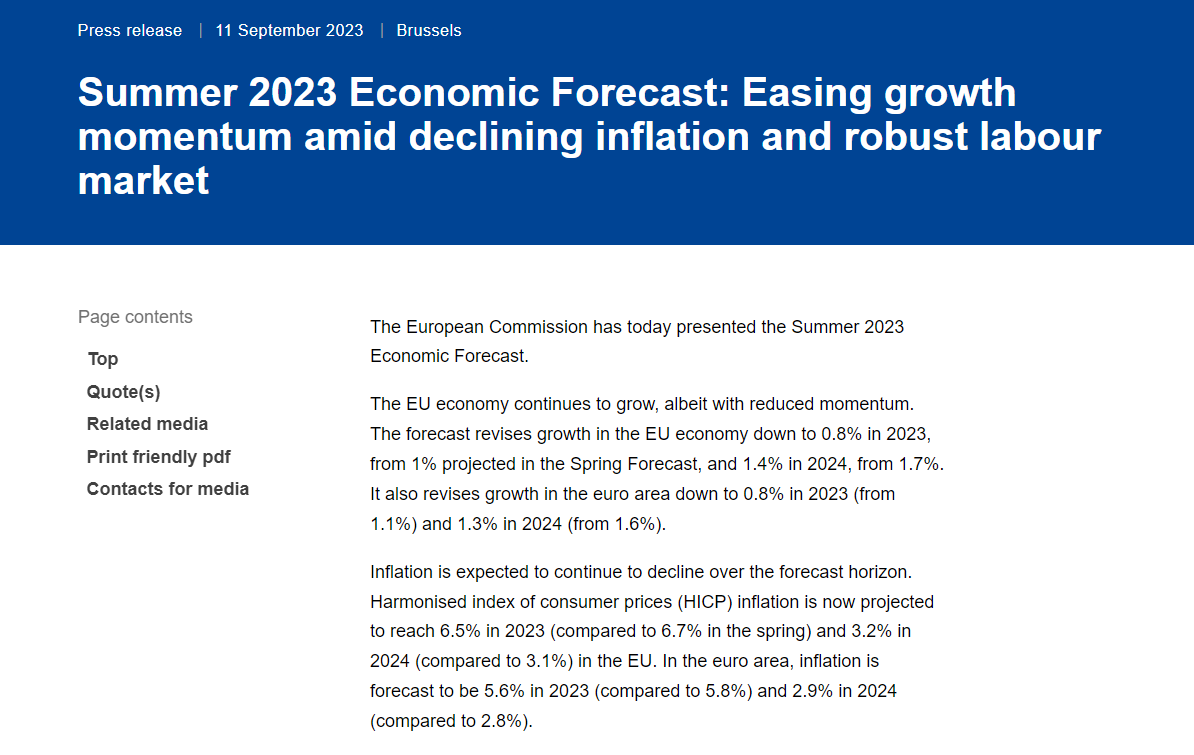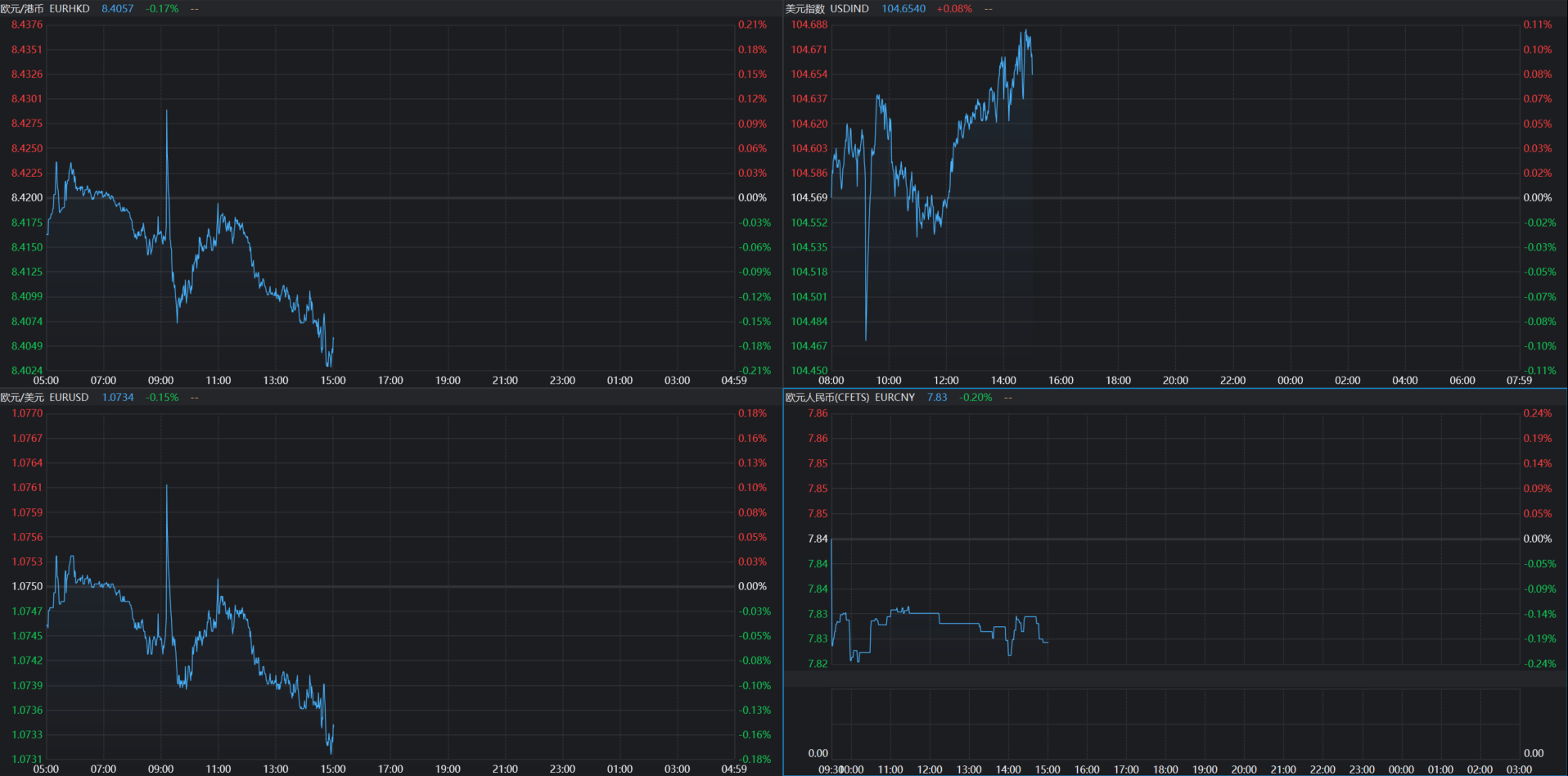The German economy may be in contraction. Money markets expect the ECB to stay put in September.
ECB to announce interest rate decision on September 14。Amid the economic malaise, the bank's probability of raising interest rates by 25 basis points in September has fallen from the previous 40 per cent to the current 30 per cent, according to money market expectations.。
On September 11th, dragged down by a possible contraction in the German economy, the European Commission lowered its growth outlook for the euro zone's 20-nation economy, casting another cloud over the euro zone's already struggling economic outlook.。

According to the latest forecast released on the same day by the European Union's executive body, the 20 countries in the euro zone will only grow by 0% in 2023..8%, compared to the previous forecast of 1.1%。The agency also lowered its economic growth forecast for the euro zone in 2024 to 1.3%。The EU says Germany, the region's largest economy, is largely responsible for the downward revision of its economic forecasts: Germany, which was expected to grow by 2023, is now facing zero.4% decline。
The EU acknowledges that economic activity in the euro area has slowed sharply at the moment。First, consumption in the region has gradually weakened, with consumer prices for most goods and services remaining high and still rising, causing more severe losses than expected in the spring forecast.。Second, despite falling energy prices, an unusually strong labor market and rising wages, the economy has been hit hard.。
The tightening of bank liquidity to the economy has also hit the economy in the euro area.。Eurozone money supply fell 0 in July from a year earlier, data show.4%, mainly due to a decrease in loans。According to statistics, in July, the growth rate of borrowing to the private sector fell to 1..6%; loans to government also fell by 2.7%, the biggest drop since 2007。At the same time, home loans, mainly home mortgages, are continuing to decline as lending rates rise。
According to the current survey, although tourism is in peak season in many parts of Europe, the slowdown in economic activity in the region this summer and in the coming months seems irreversible.。With the gradual contraction of services and manufacturing, such shocks will have the most pronounced impact on Germany。The Kiel Institute predicts that after a winter downturn, the German economy failed to expand in the second quarter and the country may shrink by 0 in the third quarter..3%, which is a serious drag on the eurozone's growth prospects。
The only good news is that the EU expects inflation in the euro area to fall further during the year and pick up slightly in 2024.。In terms of the Harmonized Index of Consumer Prices (HICP) inflation rate, this value is expected to fall back to 6 in 2023..5%, compared to this spring forecast of 6.7%, and gradually decline to 3 in 2024.2%, compared to this spring forecast of 3.1% increase。Looking at the overall inflation forecast for the euro area, inflation in the region is expected to be 5.6%, slightly lower than the 5 given in the spring.8%, and gradually fall back to 2 in 2024.9%, compared with the previously given 2.8% increase。
ECB to announce interest rate decision on September 14。Amid the economic malaise, the bank's probability of raising interest rates by 25 basis points in September has fallen from the previous 40 per cent to the current 30 per cent, according to money market expectations.。In other words, the ECB is likely to keep its benchmark interest rate unchanged this month.。
In this regard, the European Central Bank Management Committee, the French central bank governor Francois Villeroy de Galhau recently said that interest rates are close to highs, but he refused to specify that this means that the European Central Bank next week interest rate meeting will raise interest rates or keep interest rates unchanged.。"I'm not going to say what we will decide on September 14 because we still have options at this meeting and beyond."。But I believe that we are close or very close to interest rate highs。He also added that keeping interest rates high for long enough is clearly more important now than raising rates again.。
For the euro zone economic outlook, Francois Villeroy de Galhau believes that the euro zone countries, including Germany, will be more affected, but the entire euro zone will still avoid recession。He said: "As far as the eurozone as a whole is concerned, we are not seeing a recession at the moment.。The outlook for France and the euro area is slightly positive and slower growth, respectively.。"
As of press time, the euro edged down 0 against the Hong Kong dollar on the day..17%, reported 8.4057; EUR / USD down 0.15%, reported 1.0734; EUR / CNY (CFETS) down slightly 0.2% at 7.83; the dollar index edged up 0.08% at 104.6540。

·Original
Disclaimer: The views in this article are from the original Creator and do not represent the views or position of Hawk Insight. The content of the article is for reference, communication and learning only, and does not constitute investment advice. If it involves copyright issues, please contact us for deletion.